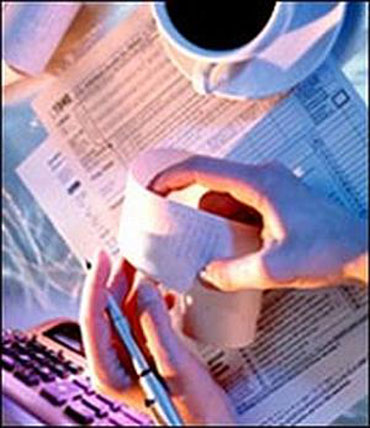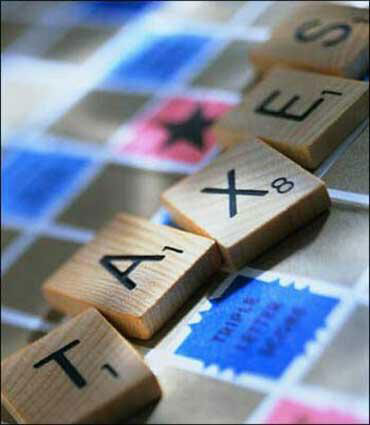 | « Back to article | Print this article |
Tax filing for self-employed professionals
The Income Tax Act states, 'Profession implies apparent achievement in special knowledge as distinguished from mere skill, special knowledge has to be acquired only after study and application.'
It covers doctors, lawyers, engineers, architects, accountants, consulting engineers, artists, musicians, singers and interior decorators, et cetera. These professionals also need to file their taxes.
How is tax accounted?
Mercantile system: Here net profit or loss is calculated after taking into consideration all income and expenses of a particular accounting period irrespective of whether or not income was received or expenses paid during that accounting period.
Cash system: Here a record has to be kept of actual receipts and actual payments of a particular year.
Click NEXT to read on. . .
Tax filing for self-employed professionals
Permissible deductions:
- Rent, rates, taxes, repairs and insurance of premises utilized for the profession.
- Repairs, depreciation and insurance of machinery, plant and furniture utilized for the profession.
- Expenditure in respect of scientific research, like in-house research, contribution to an approved university, college, or association, etc.
- Premium in respect of insurance against risk of damage or destruction of stock and stores used for profession.
- Premium in respect of health insurance of the employees.
- Bonus and commission to employees.
- Interest on capital borrowed for profession.
- Contribution to a recognised provident fund or an approved gratuity fund.
- Bad debts related to the profession. -- Bad debts have to be written off as 'unable to recover' in the books by the assessee in the previous year.
- Banking cash transaction tax, securities transaction tax and commodities transaction tax are allowed as deductions.
- Any expenditure (not capital and personal) incurred wholly and exclusively for the profession and within the legal rules.
Click NEXT to read on. . .
Tax filing for self-employed professionals
Expenses not allowed as deduction are:
- Expenditure on advertisement in any souvenir, etc. of a political party.
- Any interest, salary, royalty, fees for technical services or other sum payable outside India from which TDS as not been deducted.
- Any tax calculated on the basis of profits or gains of profession, e.g. income tax; Wealth tax.
- Expenses exceeding Rs 20,000, e.g.: X pays Rs 6,000 Rs 20,000 and Rs 20,500 by account payee cheques.
- As per income tax, Rs 20,500 paid by bearer cheque will be disallowed.
Hence, it is best to pay amounts exceeding Rs 20,000 by cheque.
Click NEXT to read on. . .
Tax filing for self-employed professionals
Things to keep in mind
Book-keeping requirements
Case 1: If the gross receipts are less that Rs 1.50 lakh (Rs 150,000), the assessee has to maintain his accounts which enables the Income Tax official to compute the taxable Income.
Case 2: If the gross receipts exceed Rs 1.50 lakh, the assessee has to maintain books of accounting like the cash book, journal, ledger, copies of bills exceeding Rs 25. Accounts should be maintained either on mercantile basis or cash basis.
In case of professional income, accounts have to be audited if gross receipts exceed Rs 10 lakh (Rs 1 million). This audit report should be submitted along with the income tax return, before September 30.
PAN: Every person whose total sales, turnover or gross receipts are over Rs 500,000 are required to apply and obtain a Permanent Account Number (PAN).
Click NEXT to read on. . .
Tax filing for self-employed professionals
Advance tax:
Since a professional earns his own income, there is no TDS. Hence, he is liable to pay advance tax as he earns income. Thus, advance tax is payable on the basis of estimated income of the current financial year. Advance tax is payable only in cases where tax payable is in excess of Rs 5,000.
Payment of advance tax:
- 30% on or before September 15.
- 30% on or before December 15.
- Remaining 40% on or before March 15.
If there was shortfall in earlier installment, it should be made up in subsequent installment
Due dates for filing returns:
Assessee having income from profession but who do not have to get the accounts audited under Income Tax or any other law has to file returns by 31st July.
Assessee who gets his accounts audited has to file returns by September 30.
Return Form :
Form ITR 4 needs to be utilized to file returns and can be submitted to either in the physical form or in the electronic form with a digital signature.
Powered by
BankBazaar.com is an online marketplace where you can instantly get loan rate quotes, compare and apply online for your personal loan, home loan and credit card needs from India's leading banks and NBFCs.
Copyright 2025 www.BankBazaar.com. All rights reserved.




